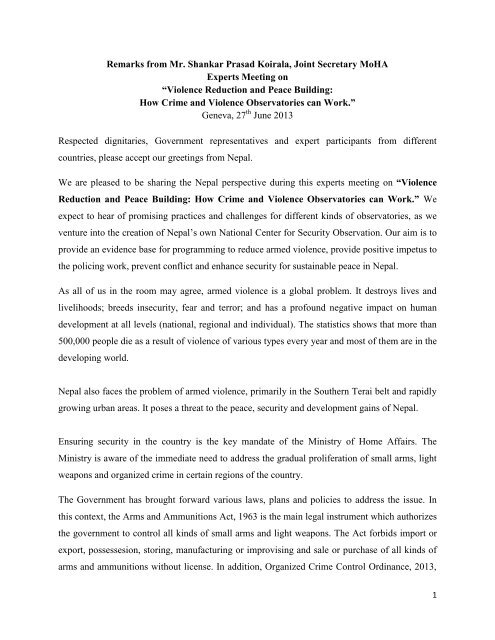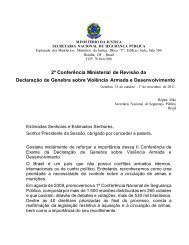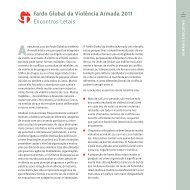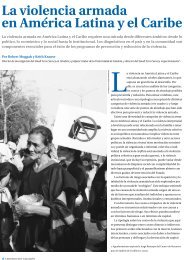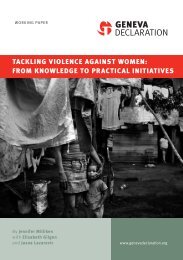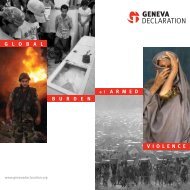Speech - The Geneva Declaration on Armed Violence and ...
Speech - The Geneva Declaration on Armed Violence and ...
Speech - The Geneva Declaration on Armed Violence and ...
Create successful ePaper yourself
Turn your PDF publications into a flip-book with our unique Google optimized e-Paper software.
Remarks from Mr. Shankar Prasad Koirala, Joint Secretary MoHA<br />
Experts Meeting <strong>on</strong><br />
“<strong>Violence</strong> Reducti<strong>on</strong> <strong>and</strong> Peace Building:<br />
How Crime <strong>and</strong> <strong>Violence</strong> Observatories can Work.”<br />
<str<strong>on</strong>g>Geneva</str<strong>on</strong>g>, 27 th June 2013<br />
Respected dignitaries, Government representatives <strong>and</strong> expert participants from different<br />
countries, please accept our greetings from Nepal.<br />
We are pleased to be sharing the Nepal perspective during this experts meeting <strong>on</strong> “<strong>Violence</strong><br />
Reducti<strong>on</strong> <strong>and</strong> Peace Building: How Crime <strong>and</strong> <strong>Violence</strong> Observatories can Work.” We<br />
expect to hear of promising practices <strong>and</strong> challenges for different kinds of observatories, as we<br />
venture into the creati<strong>on</strong> of Nepal’s own Nati<strong>on</strong>al Center for Security Observati<strong>on</strong>. Our aim is to<br />
provide an evidence base for programming to reduce armed violence, provide positive impetus to<br />
the policing work, prevent c<strong>on</strong>flict <strong>and</strong> enhance security for sustainable peace in Nepal.<br />
As all of us in the room may agree, armed violence is a global problem. It destroys lives <strong>and</strong><br />
livelihoods; breeds insecurity, fear <strong>and</strong> terror; <strong>and</strong> has a profound negative impact <strong>on</strong> human<br />
development at all levels (nati<strong>on</strong>al, regi<strong>on</strong>al <strong>and</strong> individual). <str<strong>on</strong>g>The</str<strong>on</strong>g> statistics shows that more than<br />
500,000 people die as a result of violence of various types every year <strong>and</strong> most of them are in the<br />
developing world.<br />
Nepal also faces the problem of armed violence, primarily in the Southern Terai belt <strong>and</strong> rapidly<br />
growing urban areas. It poses a threat to the peace, security <strong>and</strong> development gains of Nepal.<br />
Ensuring security in the country is the key m<strong>and</strong>ate of the Ministry of Home Affairs. <str<strong>on</strong>g>The</str<strong>on</strong>g><br />
Ministry is aware of the immediate need to address the gradual proliferati<strong>on</strong> of small arms, light<br />
weap<strong>on</strong>s <strong>and</strong> organized crime in certain regi<strong>on</strong>s of the country.<br />
<str<strong>on</strong>g>The</str<strong>on</strong>g> Government has brought forward various laws, plans <strong>and</strong> policies to address the issue. In<br />
this c<strong>on</strong>text, the Arms <strong>and</strong> Ammuniti<strong>on</strong>s Act, 1963 is the main legal instrument which authorizes<br />
the government to c<strong>on</strong>trol all kinds of small arms <strong>and</strong> light weap<strong>on</strong>s. <str<strong>on</strong>g>The</str<strong>on</strong>g> Act forbids import or<br />
export, possessesi<strong>on</strong>, storing, manufacturing or improvising <strong>and</strong> sale or purchase of all kinds of<br />
arms <strong>and</strong> ammuniti<strong>on</strong>s without license. In additi<strong>on</strong>, Organized Crime C<strong>on</strong>trol Ordinance, 2013,<br />
1
Amendment of Anti M<strong>on</strong>ey Laundering 2013, Special Security Plan 2009, Small Arms C<strong>on</strong>trol<br />
Policy 2009, Management of Seized Arms <strong>and</strong> Ammuniti<strong>on</strong> Policy 2013 are other legal <strong>and</strong><br />
policy instruments.<br />
<str<strong>on</strong>g>The</str<strong>on</strong>g> Special Security Plan 2009, was implemented in 26 districts of the Terai <strong>and</strong> the Eastern<br />
Hills al<strong>on</strong>g with the Kathm<strong>and</strong>u valley <strong>and</strong> has six major goals including: a) tackling organized<br />
crime; b) eradicating highway blockade; c) dealing with cases of impunity; d) ensure public<br />
services delivery; e) restrict forced closure of public offices <strong>and</strong> educati<strong>on</strong>al instituti<strong>on</strong>s <strong>and</strong> f)<br />
increase participati<strong>on</strong> in security management.<br />
Likewise, the Small Arms C<strong>on</strong>trol Policy 2009 is more focused <strong>on</strong> seizing all kinds of illicit<br />
small arms <strong>and</strong> light weap<strong>on</strong>s, c<strong>on</strong>trol crimes <strong>and</strong> provide security to the local people. Recently<br />
the efforts in this directi<strong>on</strong> have been reinvigorated <strong>and</strong> <strong>on</strong>ly in the last three m<strong>on</strong>ths period,<br />
5898 different types of weap<strong>on</strong>s are h<strong>and</strong>ed over by the public to the security agencies.<br />
<str<strong>on</strong>g>The</str<strong>on</strong>g> Government of Nepal is totally committed to its signatory status under the <str<strong>on</strong>g>Geneva</str<strong>on</strong>g><br />
<str<strong>on</strong>g>Declarati<strong>on</strong></str<strong>on</strong>g> <strong>on</strong> <strong>Armed</strong> <strong>Violence</strong> <strong>and</strong> Development. Currently, the Ministry of Home Affairs <strong>and</strong><br />
United Nati<strong>on</strong>s Development Programme have worked together extensively around the<br />
development of a new project <strong>on</strong> '<strong>Armed</strong> <strong>Violence</strong> Reducti<strong>on</strong> <strong>and</strong> Community Security'<br />
(AVRSCS). This project is under final review before a formal launch.<br />
Improving M<strong>on</strong>itoring, Analysis <strong>and</strong> Reporting of Crime <strong>and</strong> <strong>Violence</strong> Data c<strong>on</strong>stitutes a<br />
foundati<strong>on</strong> st<strong>on</strong>e for the <strong>Armed</strong> <strong>Violence</strong> Reducti<strong>on</strong> <strong>and</strong> Strengthening Community Security<br />
(AVRSCS) project jointly developed by Nepal’s Ministry of Home Affairs (MoHA) <strong>and</strong> UNDP<br />
in Nepal over the last <strong>on</strong>e <strong>and</strong> a half years.<br />
<str<strong>on</strong>g>The</str<strong>on</strong>g> AVRSCS project has five pillars :<br />
1. Enhance capacities to m<strong>on</strong>itor <strong>and</strong> analyze the incidence <strong>and</strong> distributi<strong>on</strong> of armed<br />
violence to inform strategy development <strong>and</strong> planning;<br />
2. Strengthen the capacities of the MoHA, NP, APF <strong>and</strong> NID to effectively c<strong>on</strong>trol small<br />
arms <strong>and</strong> enhance community security;<br />
3. Strengthen capacities for government-led coordinati<strong>on</strong> <strong>on</strong> armed violence reducti<strong>on</strong>;<br />
2
4. Support armed violence reducti<strong>on</strong> initiatives in priority districts/localities <strong>and</strong> build<br />
c<strong>on</strong>fidence of citizens in State instituti<strong>on</strong>s; <strong>and</strong><br />
5. Increase public awareness <strong>and</strong> educati<strong>on</strong> <strong>on</strong> armed violence reducti<strong>on</strong>.<br />
<str<strong>on</strong>g>The</str<strong>on</strong>g> first pillar of the project prioritizes data m<strong>on</strong>itoring, analysis <strong>and</strong> reporting for the creati<strong>on</strong><br />
of a str<strong>on</strong>g evidence base that informs police tactic <strong>and</strong> strategy in efforts to strengthen security<br />
in regi<strong>on</strong>s identified as vulnerable to such violence.<br />
A workshop in early May 2013, participated by different officials from the Government of<br />
Nepal including representatives from all police bodies <strong>and</strong> the Ministry of Home Affairs<br />
(MoHA), produced a strategy for the Nati<strong>on</strong>al Center for Security Observati<strong>on</strong> in Nepal. We<br />
expect to start the physical setting up of the Observatory with support from UNDP in Nepal, by<br />
next m<strong>on</strong>th.<br />
Preceding the workshop, a senior delegati<strong>on</strong> from the Government of Nepal visited the Crime<br />
<strong>and</strong> <strong>Violence</strong> Observatory in H<strong>on</strong>duras <strong>and</strong> brought back the less<strong>on</strong>s applicable to the Nepal<br />
scenario. <str<strong>on</strong>g>The</str<strong>on</strong>g> strength of the H<strong>on</strong>duras observatory was its independence, the multidimensi<strong>on</strong>al<br />
expertise involved <strong>and</strong> their work with ‘youth at risk.’<br />
I would also highlight that H<strong>on</strong>duras Observatory had a lot of interesting aspects, but the<br />
delegati<strong>on</strong> felt, that there was an apparent absence of clear lines of communicati<strong>on</strong> between the<br />
observatory <strong>and</strong> the police. No matter how robust the collected data, in the absence of the<br />
collaborati<strong>on</strong> with the security bodies, its effective utilizati<strong>on</strong> shall remain questi<strong>on</strong>able.<br />
<str<strong>on</strong>g>The</str<strong>on</strong>g> security bodies of the Government are resp<strong>on</strong>sible for preventing crime <strong>and</strong> violence, <strong>and</strong><br />
therefore the Nepal strategy for its observati<strong>on</strong> system puts government leadership at the centre<br />
for the collecti<strong>on</strong>, analysis <strong>and</strong> management of such data. <str<strong>on</strong>g>The</str<strong>on</strong>g> expectati<strong>on</strong> is to be able to<br />
translate the data into police acti<strong>on</strong> plans immediately.<br />
Such a strategy will lay the foundati<strong>on</strong> for a robust crime <strong>and</strong> violence surveillance system,<br />
owned <strong>and</strong> led by the Government <strong>and</strong> informing government security <strong>and</strong> development acti<strong>on</strong><br />
plans. <str<strong>on</strong>g>The</str<strong>on</strong>g> analysis from such system could facilitate preemptive activities in the day to day work<br />
of the security bodies to prevent violence escalati<strong>on</strong> <strong>and</strong> act as some sort of early warning<br />
measure. It would also strengthen underst<strong>and</strong>ing of crime <strong>and</strong> violence, building <strong>on</strong> authentic<br />
3
<strong>and</strong> accurate data <strong>and</strong> analysis <strong>and</strong> prevent misc<strong>on</strong>strued informati<strong>on</strong>. <str<strong>on</strong>g>The</str<strong>on</strong>g> police undoubtedly<br />
would be the major source of authentic primary data <strong>on</strong> the issue as they have the broadest<br />
outreach <strong>and</strong> access even to the most remote parts of the country.<br />
That is the reas<strong>on</strong> why we expect the Nati<strong>on</strong>al Security Observati<strong>on</strong> System in Nepal to be<br />
located at the Crime Investigati<strong>on</strong> Department in the Nepal Police under the overall leadership of<br />
MoHA, so that the data that gets collected <strong>and</strong> analyzed can immediately translate into police<br />
acti<strong>on</strong> plans but also inform local development priorities.<br />
<str<strong>on</strong>g>The</str<strong>on</strong>g> best AVR practices exhibit multi sectoral approach with targeted efforts designed to address<br />
the root causes of violence al<strong>on</strong>gside efforts to build str<strong>on</strong>ger relati<strong>on</strong>s between the security<br />
providers <strong>and</strong> communities but also to address the disenfranchisement <strong>and</strong> grievances. Such<br />
efforts have the potential to prevent <strong>and</strong> reduce armed violence. Hence we recognize the<br />
importance of scientific analysis of the collected data to inform multidimensi<strong>on</strong>al programming<br />
resp<strong>on</strong>ses. Hence the observati<strong>on</strong> system shall include a scientific team who can access the<br />
desensitized crime <strong>and</strong> violence data to analyze it in its different aspects <strong>and</strong> derive analytical<br />
reports, that can c<strong>on</strong>tribute to not <strong>on</strong>ly better security planning <strong>and</strong> resp<strong>on</strong>ses but also<br />
development resp<strong>on</strong>ses.<br />
Effective programs strengthen what exists by incorporating new dimensi<strong>on</strong>s suited to the<br />
particular c<strong>on</strong>text. <str<strong>on</strong>g>The</str<strong>on</strong>g> Nepal police have an extensive system of data collecti<strong>on</strong> <strong>and</strong> m<strong>on</strong>itoring.<br />
However, there is a clear need for strengthening the analysis of such data, incorporating different<br />
expert perspectives so as to inform NP’s strategic orientati<strong>on</strong> <strong>and</strong> create at the tactical level -<br />
operati<strong>on</strong>al tools for the preventi<strong>on</strong> <strong>and</strong> fight against crime. Analysis is c<strong>on</strong>ducted by the Nepal<br />
police but more <strong>on</strong> a needs basis at specific locati<strong>on</strong>s rather than <strong>on</strong> a more systematic <strong>and</strong><br />
instituti<strong>on</strong>alized basis. <str<strong>on</strong>g>The</str<strong>on</strong>g>re is a clear need for the instituti<strong>on</strong>alizati<strong>on</strong> of such analytical<br />
practices, regular victimizati<strong>on</strong> surveys <strong>and</strong> reporting <strong>on</strong> the emergent trends. We expect the<br />
proposed center for security observati<strong>on</strong> to fill in this gap.<br />
In the Nepalese scenario with a rather politicized civil society <strong>and</strong> academia, strengthening<br />
government systems can provide an avenue to enhance the effectiveness of our work in relati<strong>on</strong><br />
to security. It will also facilitate an in depth underst<strong>and</strong>ing of the nature of the problem for<br />
development interventi<strong>on</strong>s. A palatable middle course could be the building of the Government<br />
4
capacity to collect, m<strong>on</strong>itor <strong>and</strong> analyse the data but including the civil society <strong>and</strong> the academia<br />
to provide sec<strong>on</strong>dary data to the GoN <strong>and</strong> also to analyze the existing data <strong>and</strong> make specific<br />
recommendati<strong>on</strong>s <strong>on</strong> how it could inform security <strong>and</strong> development programming.<br />
Hence, building <strong>on</strong> the credibility of the Nepal police as the organizati<strong>on</strong> that has access to<br />
maximum informati<strong>on</strong> <strong>on</strong> the crime <strong>and</strong> violence cases occurring in all the parts of the country,<br />
cashing <strong>on</strong> the civil society <strong>and</strong> academia’s expert analysis <strong>on</strong> the multiple dimensi<strong>on</strong>s of the<br />
crime <strong>and</strong> violence data, the Nati<strong>on</strong>al Center for Security Observati<strong>on</strong> in Nepal shall provide a<br />
str<strong>on</strong>g evidence base for security <strong>and</strong> development programming in Nepal, crucial for Nepal’s<br />
l<strong>on</strong>g term peace <strong>and</strong> protecti<strong>on</strong> of development gains.<br />
5


